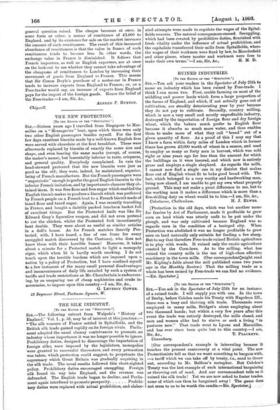THE SILK INDUSTRY.
[TO THE EDITOR OF THE "SPECTATOR."]
SIR,—The following extract from Walpole's "History of England," Vol. I., p. 58, may be of interest at this juncture :— 41 The silk weavers of France settled in Spitalfields, and the British silk trade gained rapidly on its foreign rivals. Parlia- ment adopted the usual clumsy contrivances to promote .an industry whose importance it was no longer possible to ignore. Prohibitory duties, designed to discourage the importation of foreign silks, were imposed by the legislature, monopolies were granted to successful throwsters, and every precaution was taken, which protection could suggest, to perpetuate the supremacy which Great Britain was gradually acquiring in the silk trade. The usual results followed this short-sighted policy. Prohibitory duties encouraged smuggling. Foreign silk found its way into England, and the revenue was defrauded. The English trade began to decline, and Parlia- ment again interfered to promote prosperity Prohibi- tory duties were replaced with actual prohibition, and elabor-
ated attempts were made to regulate the wages of the Spital- fields weavers. The natural consequences ensued. Smuggling, which had been created by prohibitive duties, flourished with fresh vitality under the influence of actual prohibition, and the capitalists transferred their mills from Spitalfields, where the wages of their workmen were fixed by law, to Macclesfield and other places, where master and workmen were free to
make their own terms."—I am, Sir, &c., H. M. D.






































 Previous page
Previous page